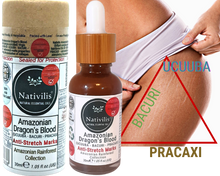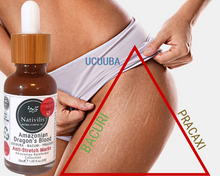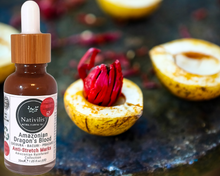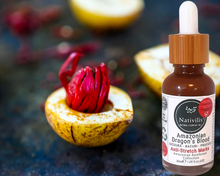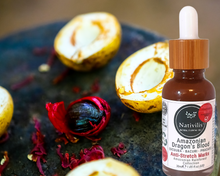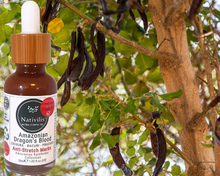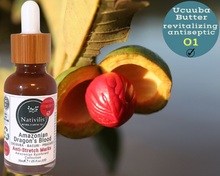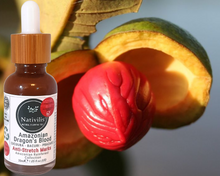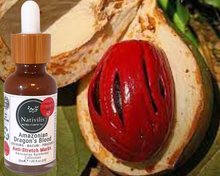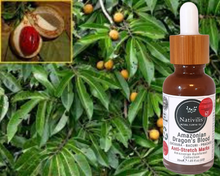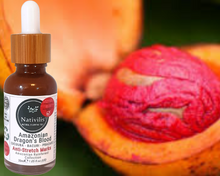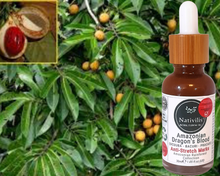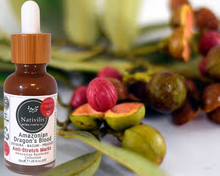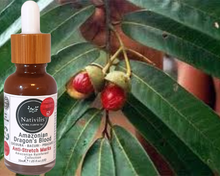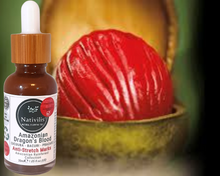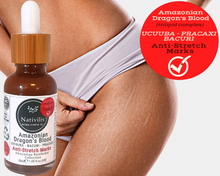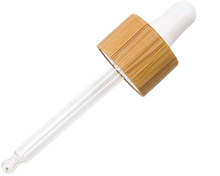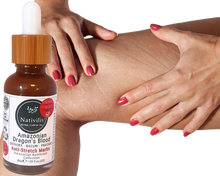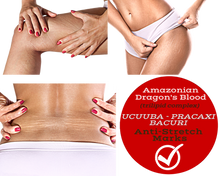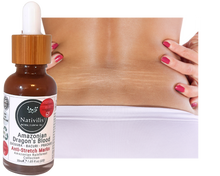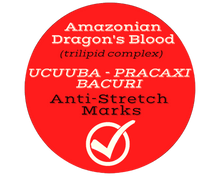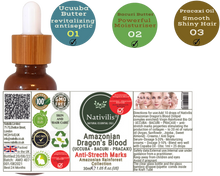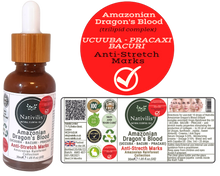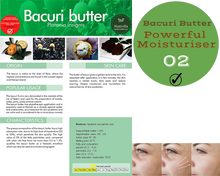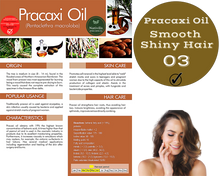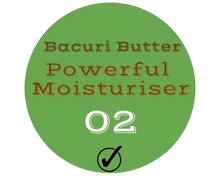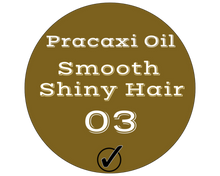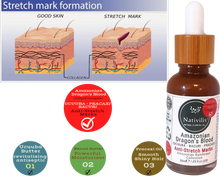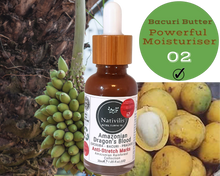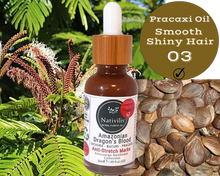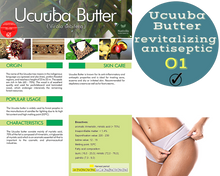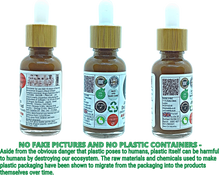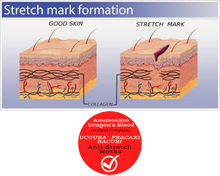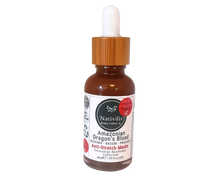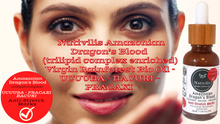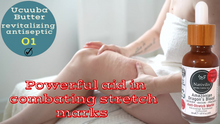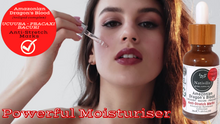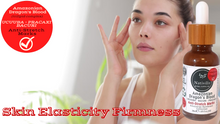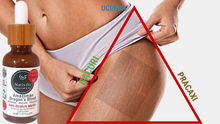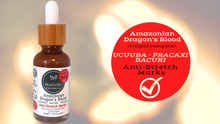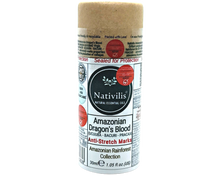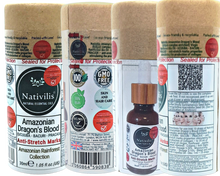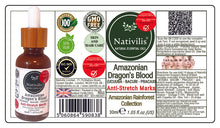

Nativilis Amazonian Dragon’s Blood (trilipid complex enriched) Virgin Rainforest Bio Oil - UCUUBA - BACURI – PRACAXI – anti-stretch marks properties stimulating the production of collagen - Copaiba
Nativilis Amazonian Dragon’s Blood (trilipid complex enriched) Virgin Rainforest Bio Oil - UCUUBA - BACURI – PRACAXI was developed with cold pressed oils, free from any solvents or oxidative heat.
Nativilis Amazonian Dragon’s Blood (trilipid complex enriched) Virgin Rainforest Bio Oil - UCUUBA - BACURI – PRACAXI is enriched with several Amazonian fats and oils. Derived from sustainable systems of the Amazonian rainforest and is completely traceable. It is an elaborate composition of UCUUB, BACURI, and PRACAXI.
PROPERTIES
Nativilis Amazonian Dragon’s Blood (trilipid complex enriched) is a trilipid complex with anti-stretch mark properties with proven efficacy. The ucuuba tree that has its name originated from the indigenous language that means ucu (grease) and yba (tree) grows in floodplains and found throughout the Amazonian rainforest. It is known as the “Dragon’s Blood” of the Amazon or healing glue of the forest. In deep wounds, this sap is used to “stick” the wound. After being tied with cloth or gauze the wound is totally healed in two days not leaving any perceptible scar. It is currently used in products for the healing of plastic surgeries.
Nativilis Amazonian Dragon’s Blood (trilipid complex enriched) also contains a great amount of behenic acid which is responsible for its main activities. This fatty acid is not produced in the skin, and has the high capacity to stimulate the production of collagen and elastin turning it into a powerful aid in combating stretch marks in adolescents and pregnant women.
INDICATIONS
Nativilis Amazonian Dragon’s Blood (trilipid complex enriched) is indicated to eliminate or attenuate deep and superficial stretch marks. 100% natural product, derived from the processing of Amazonian fats and oils.
The rainforest is still destroyed for short term profits – for unsustainable timber exploration and slash-and- -burn activities for low valuable cash cropping and cattle farming. A highly promising alternative is the purchase of non-timber products such as seeds and fruits. The collection of the seeds is carried out with the involvement of the local forest communities cultivating partnerships driven by fairness, transparency, respect, and ethics. Thus, we can assure that the sourcing practices are in strict compliance with the respect of traditional knowledge, for the environment, and guarantee its full traceability. Nativilis advocates the preservation of the Amazonian Rainforest by promoting the use and creating consumer markets for these sustainable and renewable rainforest resources, which contribute to poverty alleviation and local development. You are most invited to learn more about the Amazonian biodiversity

-
-
Nativilis Amazonian Dragon’s Blood (trilipid complex enriched) Virgin Rainforest Bio Oil - UCUUBA - BACURI – PRACAXI – anti-stretch marks properties stimulating the production of collagen - Copaiba
-
Scientific name: Elaeis oleifera
- Part Used of the plant: Fruit
- Production Process: Cold Extraction
-
Cultivation: Wild
-
Country of Origin: Brazil
-
Major Compounds: : Platonia Insigns Seed Butter;Virola Surinamensis Seed butter; Pentaclethra macroloba Seed Oil. (See the Certification of Analysys)
- Blends well with: Copaiba.
- Source of raw material: Amazonian Rainforest / Brazil
- Batch number: AMO 407 - 001/082021
- Preservatives: Absent
- Number of analysis: 244/2021
- Solvent extraction: Absent
- date: 02/08/2021
- Origin of the vegetable drugs: Wildcrafted
- Shelf life: 24 Months
-
SAFETY HEALTH: Product harmless, for cosmetic use only. Not suitable for human consumption.
- STORAGE: Should be stored tightly sealed, protected from light and heat.
-
Directions for use: Topical use:
Add 10 drops of Nativilis Amazonian Dragon’s Blood (trilipid complex enriched) Virgin Rainforest Bio Oil - UCUUBA - BACURI – PRACAXI – anti-stretch marks properties stimulating the production of collagen to 20 ml of natural oil (Argan, Sunflower , Jojoba , Sweet Almond)
Massage Creams – Dosage 5-20%
Anti Stretch Marks Serum – Dosage 5-20%
Moisturizing creams – Dosage 3-10%
Liquid soap – Dosage 0,5-3%
Bar soaps – Dosage 1-5%
Blend very well with Copaiba Oil
Obs: 1ml = 25 drops -
Best Use: 24 Months
- Shipping Weight:0.08 kg
- SKU: DragonsBloodAMZ-5060864590838
- Type: GTIN-13 - Number:5060864590838
- Volume: 30 ml -
- Dimensions Outer Packaging Recyclable Tube Cardboard Paper Kraft :102 mm (H) x 36 mm (D)
-
Safety data: External use recommended. Internal use under guidance from
a qualified practitioner. Keep away from children and eyes. Avoid if pregnant. Store in a cool dry place. - Clear Glass Bottle: We sell our oil in clear glass bottles to be able to appreciate their beautiful and therapeutic colours.
- The Outer Packaging Recyclable Tube Cardboard Paper Kraft are to protect the oil from light. The Eco-Friendly Cap Glass Bottle Dropper comes inside the Tube, with the Clear Glass Bottle.
-
Eco-Friendly Bamboo Cap Glass Bottle Dropper -
Our new bamboo dropper/pipette assembly are manufactured to precise specifications for use with DIN18 moulded glass bottles and tubular glass vials. Suitable for 10ml and 30ml Glass Clear Bottle with DIN 18
Outer cap material bamboo (real bamboo wood) varnished
Inner cap material – Polypropylene (PP)
Dropper pipette material – low borosilicate glass
Teat material – white silicon or natural rubber
Ideal for tincture oils for aromatherapy, homeopathic remedies, healthcare applications, beauty products, fragrances, hair serums, beard oils, toiletries, essential oils, fragrance oils, and many other applications. -
Glass Bottle Dropper - Additional information Weight 0.5 kg / Dimensions 38 × 25 × 6 cm
-

Amazonian Dragon’s Blood
Virola Surinamensis, commonly known as ucuuba, ucuhuba or chalviande, is an evergreen tree native to the Amazon rainforest belonging to the Myristicaceae family. It can grow up to 30m tall, producing small red fruit. Its natural habitat is humid, swampy forests on clay soils. With its compound leaves and aerial roots, the ucuuba can survive flooding. The fully grown tree can produce about 30 to 50kg of seeds per year. Abundant in fats, the seeds can yield up to 50% of butter from each kilo of dry weight.
Indigenous people have used the Virola Surinamensis tree for various medicinal purposes. Traditionally, the bark is helpful in the treatment of haemorrhoids. The leaf infusion is beneficial in treating stomach ailments. Besides that, the tree is significant economically for its wood, which is used to build furniture and other household items.
POPULAR USES
UCUUBA - Deeply moisturising and emollient, ucuuba butter is rich in saturated, long-chain fatty acids crucial for the skin’s health. Known for their occlusive effect, they can protect the skin from external threats and prevent moisture loss while keeping the skin soft and supple.

The BACURI fruit is highly demanded in the markets of Brazil and used for the preparation of sweets, cakes, jams, juices, and ice creams. Its seeds are not used and are discarded. The local population s of the central region of the Marajó island have great difficulty removing the butter from the seeds because the seeds must be soaked in water for over a year. They are then boiled, and the butter is skimmed off the surface of the boiling water.
The BACURI butter has phytotherapeutic applications and is popularly used on Marajó as a remedy against spider and snake’s bites, as a treatment for skin problems and earaches. The butter of Bacuri gives a golden tone to the skin. It is absorbed a few minutes after it is applied and the skin becomes velvety to the touch; it also removes spots and reduces scarring.

The oil of PRACAXI, which is extracted in a rudimentary way through cooking the dry mass and macerating it in a mortar, is popularly used against skin infection, as well as in the treatment of hair, which leaves it easier to comb and intensifies its brightness, avoiding hair loss.
Pracaxi bio-oil use was common to treat stretch marks in adolescences and pregnant with very satisfactory results. The inhabitants of the Amazon region make use of the stem bark to combat the effects of poison from snake and scorpion bites. For this, the bark is soaked and applied in the form of a plaster on the site of the bite. Today the seeds are collected in rivers, streams, and beaches, sun-dried, and stored for selling.

















































